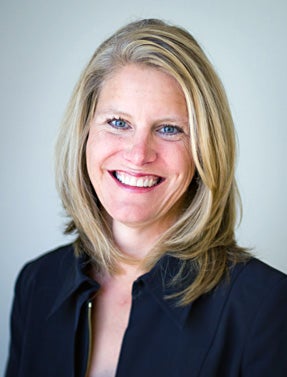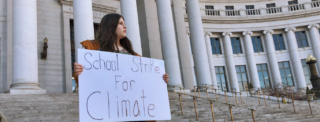- Resources
- Dear Companies: Your Future Customers And Employees Want Climate Action
Resources
Dear Companies: Your Future Customers And Employees Want Climate Action
Published: May 23, 2019 by Elizabeth Sturcken
My 12-year-old daughter Anna has become quite the environmentalist lately. She’s even started turning out the lights while you’re in the room to save on energy! Yes, this can be annoying. But I admire her passion and enjoy watching her become more invested in our planet.
Anna and the 1.4 million kids skipping class to protest climate change this spring give me hope. I got goosebumps when I heard the charismatic 16-year-old Swedish climate activist Greta Thunberg, whose actions started this movement, speak. She summed it up perfectly when she said: “We can’t save the world by playing by the rules because the rules have changed.”
These kids are on the front line. It’s their futures at stake. They’re scared, they’re angry and they’re energized.
And they should be on businesses’ radar.
Why? In a 2018 survey by MNI more than half of Generation Z respondents – that’s kids born between 1995 and 2012 – said that knowing a brand is socially conscious has an influence on what they buy. 76% of US parents said their kids influenced their purchasing decisions. By 2020, Generation Z will account for 40% of all U.S. consumers.

Take Anna. When she’s not busy turning out lights, she’s writing letters. Most recently she’s asked our local boba tea shop to stop using plastic straws and American Girl Doll to run a feature about climate change for their magazine. What a business is doing to be sustainable, how they’re acting to protect the planet – these things matter to her and they influence what she buys.
The companies which should be the most focused on these trends are the likes of Walmart, the world’s biggest retailer and Amazon, which owns 49% of all U.S. e-commerce spend. But all companies, big and small, can send demand signals down their supply chains, calling for more sustainable products.
The opportunity for good is huge. The consumer goods sector is responsible for 60% of all greenhouse gas emissions, 80% of all water use and 66% of all tropical deforestation. And doing good for the environment creates business value in cost savings, risk reduction and new product innovation, as well as customer and employee engagement.
In fact, how young employees view their company’s efforts on sustainability has also come under the spotlight recently. Last month, over 7,500 Amazon employees signed on to a powerful letter pointing out that Amazon’s action on climate has not been close to the level of ambition and innovation the world expects and requires of the company.

Even prospective employees are concerned about this issue. Three-quarters of millennials consider a company’s social and environmental commitments when deciding where to work and nearly two-thirds won’t take a job if a potential employer doesn’t have strong corporate social responsibility practices. Generation Z is likely to be even more discerning.
In fact research shows Generation Z is the first generation to prioritize purpose over salary when choosing an employer, with the top two causes they want their employer to support being equality and environment.
The global youth climate movement is calling for policy change. Interview after interview shows kids citing the IPCC Special Report on Global Warming warning we have just 12 years to act on climate and calling on governments to lead. But the common themes in their demands – an end to fossil fuel dependence, a growth in renewable energy, a price on carbon – have profound implications for businesses.
Some are already getting out ahead of policy change. Earlier this month, the CEOs of 13 U.S. and Global Fortune 500 companies or their subsidiaries joined the CEO Climate Dialogue, calling on Congress to accelerate climate legislation (including an economy-wide price on carbon), in accordance with the group’s guiding principles.
Others are looking inwards, focusing on their own operations. Nearly half of all Fortune 500 companies have set at least one climate or clean energy target. That number, and the ambition of the targets being set, is growing all the time.
I recently had the pleasure of hearing Walmart CEO Doug McMillon address a packed room full of suppliers and employees about Walmart’s mission to drive massive emissions reductions throughout its supply chain. Doug opened his speech with a photograph of his newborn nephew and the words: “Let me introduce you to the latest love of my life.”
That room was filled with business people, focused on driving the bottom line. But when Doug produced that picture, there was an audible sigh. Because when all is said and done, the answer to the question that matters the most – ‘How can I protect what is most precious to me?’ – lies not just in giving the next generation of consumers safer, more sustainable choices at the checkout. But by giving those we love the safer, more sustainable future they want and need.
Follow Elizabeth on Twitter.
